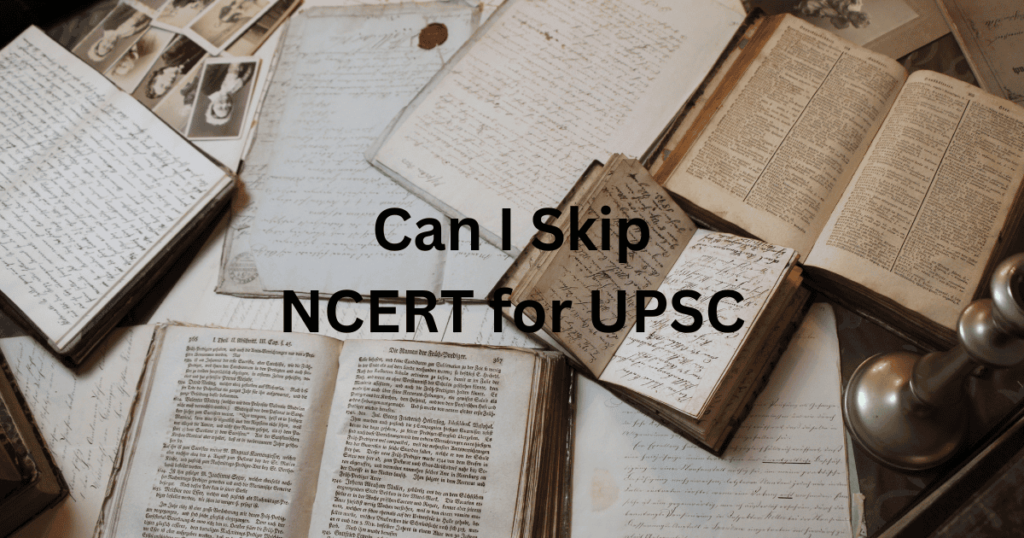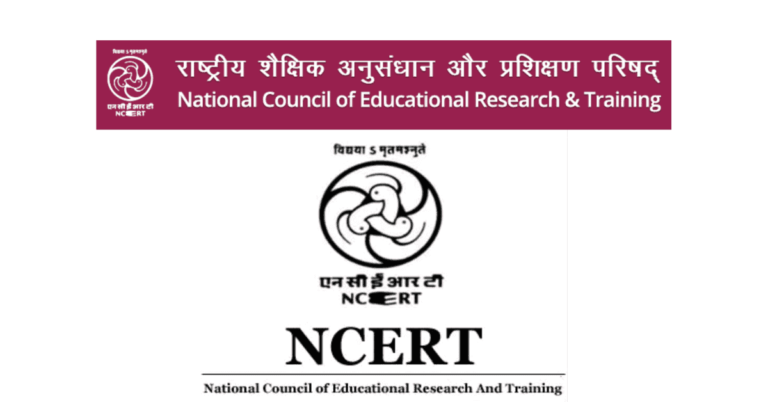Can I Skip NCERT for UPSC? A Detailed Guide for Aspirants
Can I Skip NCERT for UPSC?


Preparing for the UPSC (Union Public Service Commission) Civil Services Examination is a daunting task. Aspirants often find themselves navigating a maze of resources and study materials. Among these resources, NCERT books hold a significant place. However, a common question arises: “Can I skip NCERT for UPSC?” In this comprehensive guide, we’ll delve into this query and provide insights on whether skipping NCERT books is a wise decision or not.
Understanding the Importance of NCERT Books for UPSC
NCERT (National Council of Educational Research and Training) books are a staple for school students in India, covering subjects ranging from history and geography to science and economics. These books are known for their simplicity, clarity, and comprehensive coverage of fundamental concepts. Here’s why NCERT books are crucial for UPSC preparation:
- Foundation Building: NCERT books help in building a strong foundation. They cover basic concepts in a manner that is easy to understand, which is essential for the depth of knowledge required in UPSC exams.
- Authentic Information: These books are published by a government organization, ensuring the accuracy and reliability of the information.
- Standard Language: The language used in NCERT books is simple and straightforward, making complex topics accessible.
- Coverage of Syllabus: The UPSC syllabus overlaps significantly with the content covered in NCERT books, especially for subjects like History, Geography, Economics, and Polity.
Can I Skip NCERT for UPSC?
While it is theoretically possible to prepare for UPSC without NCERT books, it is generally not advisable. Here’s why:
- Conceptual Clarity: NCERT books are designed to provide a clear understanding of basic concepts. Skipping them might leave gaps in your fundamental knowledge, which is critical for both Prelims and Mains.
- Comprehensive Coverage: The NCERT books cover a wide range of topics that are directly relevant to the UPSC syllabus. Ignoring them could mean missing out on crucial information.
- Ease of Understanding: For beginners, NCERT books are a great starting point. They simplify complex topics, which are later elaborated upon in advanced reference books.
- Direct Questions: In the past, UPSC has directly asked questions from NCERT books. Skipping them might lead to missing out on easy marks.


Is NCERT Necessary for UPSC?
To address this, let’s look at how NCERT books fit into different stages of UPSC preparation:
- Preliminary Examination: For the Prelims, NCERT books are extremely useful. They cover essential facts and figures, which form the basis of many multiple-choice questions.
- Main Examination: For the Mains, while you need to refer to advanced books and resources, NCERT books still play a crucial role in understanding the basic framework of various topics.
- Interview: A good grasp of fundamental concepts, often derived from NCERT books, can help in answering questions confidently during the interview stage.
Which NCERT Books Are Important for UPSC?
Not all NCERT books are equally important for UPSC preparation. Here’s a list of essential NCERT books categorized by subjects:
- History:
- Ancient India by R.S. Sharma
- Medieval India by Satish Chandra
- Modern India by Bipin Chandra
- Themes in Indian History Part 1, 2, and 3 (Class 12)
- Geography:
- Geography of India (Class 6-12)
- Fundamentals of Physical Geography (Class 11)
- India: Physical Environment (Class 11)
- Fundamentals of Human Geography (Class 12)
- Polity:
- Indian Constitution at Work (Class 11)
- Political Science: Indian Polity (Class 12)
- Economics:
- Indian Economic Development (Class 11)
- Macroeconomics (Class 12)
- Microeconomics (Class 12)
- Science (for General Studies Paper 1 in Prelims):
- Science textbooks from Class 6 to 10 to cover basic concepts in Physics, Chemistry, and Biology.
- Sociology:
- Introducing Sociology (Class 11)
- Understanding Society (Class 11)
- Indian Society (Class 12)
- Social Change and Development in India (Class 12)
Can I Clear UPSC Without NCERT?
Clearing UPSC without NCERT is highly challenging and not recommended for several reasons:
- Base Knowledge: NCERT books lay the groundwork for understanding advanced topics. Without this base, comprehending higher-level books can be difficult.
- Cost and Time Efficiency: NCERT books are economical and concise. They save time by presenting information directly relevant to the UPSC syllabus.
- Quality of Preparation: Ignoring NCERT books might lead to fragmented knowledge, as advanced books often assume you are already familiar with the basics covered in NCERTs.
Can I Skip Newspapers for UPSC?
Skipping newspapers is also not advisable for UPSC preparation. Newspapers like The Hindu, Indian Express, or even digital resources provide the following benefits:
- Current Affairs: Regularly reading newspapers keeps you updated on national and international events, essential for both Prelims and Mains.
- Analytical Skills: Editorials and opinion pieces help in developing analytical skills and provide diverse perspectives on various issues.
- Essay Writing: Newspapers offer material for essay topics and help improve your writing skills, which is crucial for the Mains examination.
Can I Crack UPSC Without NCERT?
Cracking UPSC without NCERT books is an uphill task. While it is not impossible, it would require significantly more effort and reliance on other comprehensive sources to cover the foundational knowledge.
Can I Skip Maths in UPSC?
Mathematics is not a compulsory subject for all candidates. However, basic mathematical skills are required for the CSAT (Civil Services Aptitude Test) paper in Prelims. Here’s how you can manage:
- CSAT Preparation: If you are not comfortable with Maths, practice basic arithmetic, data interpretation, and logical reasoning from simple sources. NCERT Maths textbooks from Class 6 to 10 can be helpful.
- Optional Subject: Choose an optional subject that does not require mathematical expertise. Subjects like Public Administration, Sociology, and History are popular choices among aspirants who are not inclined towards Maths.
FAQs
1. Can I clear UPSC without NCERT books?
- While possible, it is not advisable. NCERT books provide a strong foundation, and skipping them could leave significant gaps in your understanding of fundamental concepts essential for the exam.
2. Which NCERT books are most important for UPSC?
- Essential NCERT books include those covering History (Class 6-12), Geography (Class 6-12), Polity (Class 11-12), Economics (Class 11-12), and basic Science textbooks (Class 6-10).
3. How can I effectively integrate NCERT books into my UPSC preparation?
- Start with NCERTs to build a solid conceptual base, then move on to advanced reference books. Make concise notes from NCERTs and revise them regularly.
4. Can I skip reading newspapers if I follow monthly current affairs compilations?
- It is not recommended to skip newspapers entirely. Newspapers provide a broader understanding of issues, help improve reading and analytical skills, and offer diverse perspectives essential for essay writing and interviews.
5. Are NCERT books enough for the UPSC Prelims?
- NCERT books are necessary but not sufficient on their own. They should be supplemented with other standard reference books, current affairs materials, and practice tests to ensure comprehensive coverage of the syllabus.
Disclaimer:
This blog on the subject of “NCERT fingertips biology pdf” neither created nor scanned this e-book, nor are we the owner of this book. We are assisting book searchers by providing a hyperlink to the original vendor of this book and its online ecommerce website including Amazon India, for which we are an official affiliate partner; for more information, please refer to our terms and conditions page by clicking here. We created this blog specifically to assist students. Further if you wish to check out our Privacy Policy then just click here to check it.
If we are in violation of any laws or have any other problems, please contact us at [email protected] or send us an email (along with official evidence about yourself or your organisation) so that we can remove this link.
All images used on this page are creative commons images, these are images that have been licensed so that they can be used for a variety of purposes.

